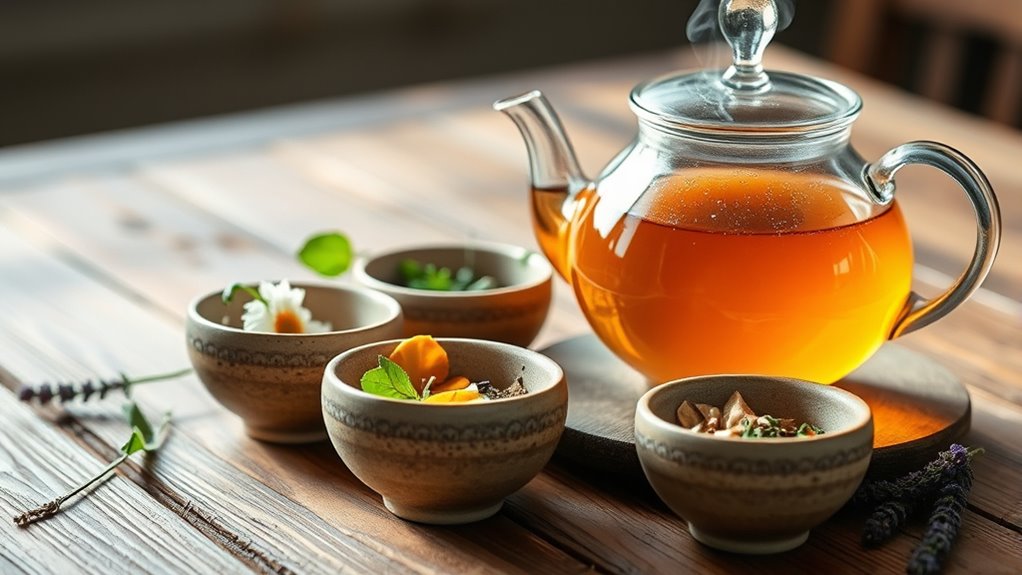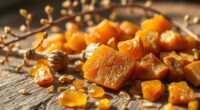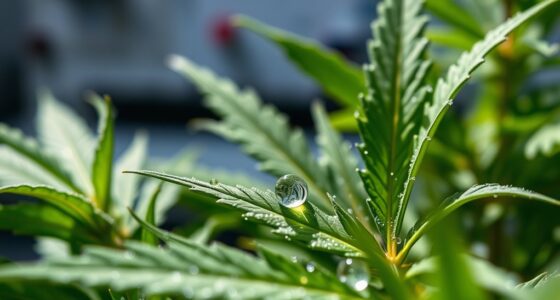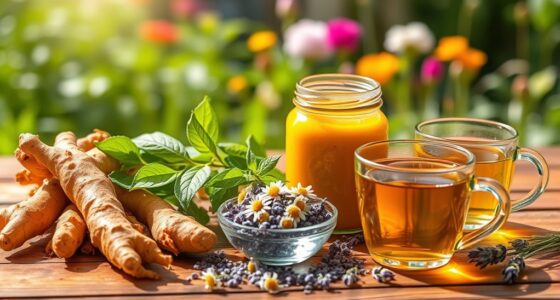To soothe everyday inflammation, try herbal teas rich in antioxidants and anti-inflammatory compounds like ginger, turmeric, chamomile, and lemon balm. Use hot water around 200°F and steep for 5 to 10 minutes, depending on the herb. Store dried herbs in airtight, dark containers to keep their potency. Proper brewing and storage maximize their benefits. If you keep these tips in mind, you’ll uncover more ways to harness their natural healing powers for inflammation relief.
Key Takeaways
- Opt for herbs like chamomile, ginger, turmeric, and lemon balm known for their anti-inflammatory properties.
- Use proper brewing techniques: hot water around 200°F and steep for 5-10 minutes to maximize benefits.
- Store dried herbs in airtight, cool, dark containers to preserve their potency and medicinal qualities.
- Choose organic herbs to ensure higher levels of beneficial compounds and reduce pesticide exposure.
- Regularly consume herbal teas as part of a balanced routine for sustained inflammation relief.
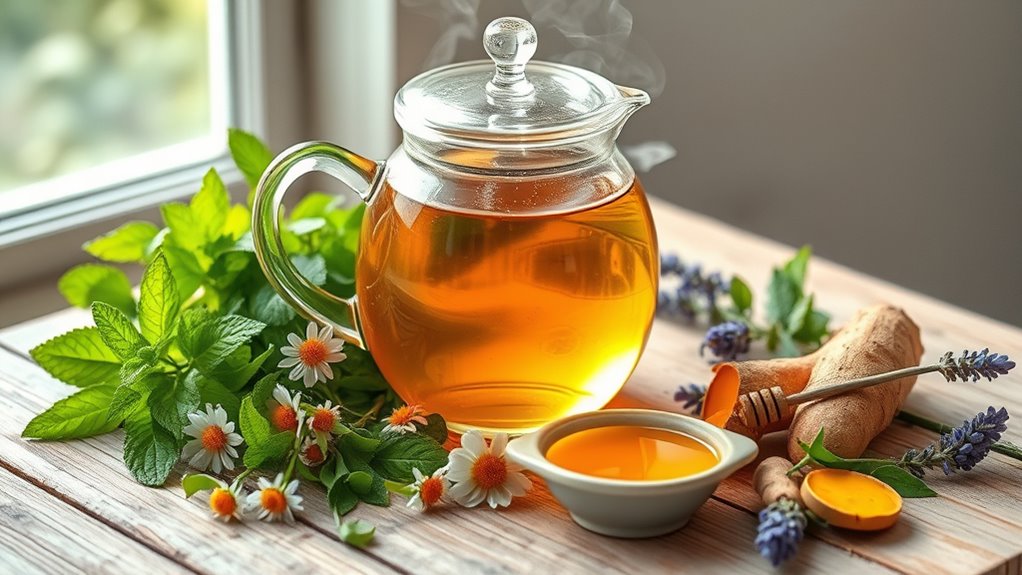
Are herbal teas effective for reducing inflammation? Many people wonder if sipping on herbal infusions can genuinely make a difference in managing everyday inflammation. The truth is, herbal teas contain compounds like antioxidants and anti-inflammatory agents that may help soothe your body’s responses to chronic or acute inflammation. To maximize these benefits, you need to pay attention to how you prepare and store your herbal teas. Proper tea brewing techniques, for example, can substantially influence the potency of the active ingredients. Steeping your herbs at the right temperature and for the correct amount of time ensures you extract the maximum anti-inflammatory properties without overdoing it, which can sometimes release bitter flavors or degrade delicate compounds. Usually, herbal teas should be steeped in hot water—around 200°F (93°C)—for about 5 to 10 minutes, but specific herbs might require adjustments. For instance, delicate herbs like chamomile or lemon balm need shorter steeping, while root-based herbs like ginger or turmeric might benefit from longer infusion times to reveal their full potential. Additionally, herbal extraction methods can impact the concentration of beneficial compounds in your tea.
Equally important is how you store your herbal tea supplies. Proper herbal tea storage methods preserve their freshness, aroma, and potency. Keep your dried herbs in airtight containers, away from direct sunlight, heat, and humidity. Glass jars with tight-fitting lids work well, as do resealable bags stored in a cool, dark place. If you buy pre-packaged herbal teas, check the expiration date and store them according to the manufacturer’s instructions. When stored correctly, your herbs retain their medicinal qualities longer, guaranteeing each cup delivers maximum anti-inflammatory benefits. Avoid using plastic containers that might leach chemicals into your herbs over time.
In addition to brewing techniques and storage methods, consider the quality of your herbs. Opt for organic options when possible, as they’re less likely to contain pesticides or contaminants that could interfere with their healing properties. When preparing your herbal teas, don’t rush the process—allowing the herbs to steep thoroughly ensures you extract the beneficial compounds effectively. By paying attention to these small details, you’re more likely to enjoy a soothing, effective cup that can help combat inflammation.
Frequently Asked Questions
Are Herbal Teas Safe for Pregnant Women With Inflammation?
When considering herbal teas during pregnancy, your priority should be pregnancy safety. While some herbal teas are safe, others may pose risks, so following herbal tea guidelines is essential. Always consult your healthcare provider before drinking any herbal tea, especially if you’re managing inflammation. They can advise you on which herbs are safe and help you avoid any that might cause adverse effects, ensuring both your health and your baby’s safety.
How Quickly Can I Expect Herbal Teas to Reduce Inflammation Symptoms?
Think of herbal teas as your trusty sidekick, much like a vintage typewriter in a digital age. Timing expectations vary, but you might start noticing symptom improvement within a few days to a week. Patience is key, as inflammation reduction depends on your body’s response, the herbs used, and consistency. Keep sipping regularly, and you’ll likely see gradual relief, making your herbal tea routine a gentle yet effective ally.
Can Herbal Teas Replace Medication for Inflammation Treatment?
You might wonder if herbal tea efficacy can replace medication for inflammation. While herbal teas offer natural inflammation management and can complement your treatment, they shouldn’t replace prescribed medication without consulting your healthcare provider. Herbal teas can help reduce mild symptoms and support overall wellness, but for serious inflammation, medication is often necessary. Always talk to your doctor to develop the safest, most effective approach for your health.
Are There Any Herbal Teas That Should Be Avoided With Certain Health Conditions?
Imagine herbal teas as friendly guides on your health journey, but some may have secret agendas. Certain herbal tea interactions and contraindications herbal teas mean you should be cautious if you have conditions like blood clotting issues, pregnancy, or medication use. Always check with your healthcare provider before adding new herbal teas to your routine, especially if you have health concerns, to avoid unintended consequences.
How Should Herbal Teas Be Stored to Maintain Their Anti-Inflammatory Properties?
When storing herbal teas, you want to focus on storage tips that preserve freshness and potency. Keep your teas in airtight containers away from light, heat, and moisture, as these can degrade their anti-inflammatory properties. Store them in a cool, dark place like a pantry or cabinet. Proper storage helps maintain their flavor and effectiveness, ensuring you get the most benefits from each cup.
Conclusion
Incorporating herbal teas into your daily routine can be a simple, natural way to reduce inflammation. Did you know that studies show certain herbal teas, like turmeric and ginger, can lower inflammatory markers by up to 25%? By choosing these teas, you not only enjoy their soothing flavors but also support your overall health. So, next time you brew a cup, remember you’re doing something positive for your body—sip your way to less inflammation every day.

